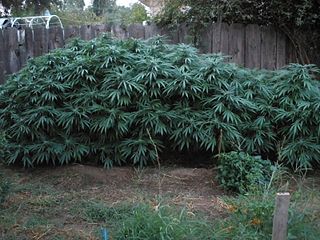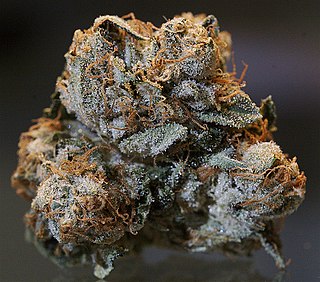Related Research Articles

420, 4:20 or 4/20 is cannabis culture slang for marijuana and hashish consumption, especially smoking around the time 4:20 pm (16:20). It also refers to cannabis-oriented celebrations that take place annually on April 20.
The National Organization for the Reform of Marijuana Laws is a social welfare organization based in Washington, D.C., that advocates for the reform of marijuana laws in the United States regarding both medical and non-medical use. According to their website, NORML supports "the removal of all penalties for the private possession and responsible use of marijuana by adults, including cultivation for personal use, and casual nonprofit transfers of small amounts" and advocates for "the creation of a legal and regulatory framework for marijuana's production and retail sale to adults". NORML also has a sister organization, NORML Foundation, that focuses on educational efforts and providing legal assistance and support to people affected negatively by current marijuana laws. NORML maintains chapters in a number of US states as well as outside the US in countries such as Canada, France, New Zealand, and South Africa.

Cannabis indica is an annual plant species in the family Cannabaceae indigenous to the Hindu Kush mountains of Southern Asia which produces large amounts of tetrahydrocannabinol (THC) and tetrahydrocannabivarin (THCV), with levels up to 53.7% of total cannabinoids, from China, India, Nepal, Thailand, Afghanistan, and Pakistan, as well as southern and western Africa, and is cultivated for purposes including hashish in India. The high concentrations of THC or THCV provide euphoric effects making it popular for use both as a recreational drug, alternative medicine, and a clinical research drug. And THCV for its platform for treating life-threatening diseases.

The High TimesCannabis Cup is a cannabis festival sponsored by High Times magazine. The event features judges from around the world who sample and vote for their favorite marijuana varieties, with cups (trophies) being awarded to the overall winner in the cannabis variety competition. Since 1997, the Cannabis Cup festival has hosted induction ceremonies for the Counterculture Hall of Fame.

Kush generally refers to a pure or hybrid Cannabis indica strain. Pure C. indica strains include Afghan Kush, Hindu Kush, Green Kush, and Purple Kush. Hybrid strains of C. indica include Blueberry Kush and Golden Jamaican Kush. The term "kush" is now also used as a slang word for cannabis.

In the United States, the use of cannabis for medical purposes is legal in 38 states, four out of five permanently inhabited U.S. territories, and the District of Columbia, as of March 2023. Ten other states have more restrictive laws limiting THC content, for the purpose of allowing access to products that are rich in cannabidiol (CBD), a non-psychoactive component of cannabis. There is significant variation in medical cannabis laws from state to state, including how it is produced and distributed, how it can be consumed, and what medical conditions it can be used for.

Leafly is a website focused on cannabis use and education. The company says it has more than 120 million annual visitors and over 10 million monthly active users. Leafly provides a wide range of information on cannabis, including 1.5 million consumer product reviews, more than 9,000 cannabis articles and resources, and over 5,000 verified strains in its database. Leafly additionally provides 4,500+ retailers and 8,000+ cannabis brands with e-commerce tools such as digital storefronts, embedded menus, point-of-sale integrations, targeted advertising, and more. The company is headquartered in Seattle, Washington and from 2012 to 2019 was owned by Privateer Holdings, a private equity firm focused on the emerging legal cannabis industry. Leafly is now a publicly traded company with 160 employees.

Steep Hill, INC. is a California-based medical cannabis and adult-use cannabis testing, analytics, and research laboratory that opened in late 2007. It was the first commercial medical cannabis testing lab to open in the United States.

The legal history of cannabis in the United States began with state-level prohibition in the early 20th century, with the first major federal limitations occurring in 1937. Starting with Oregon in 1973, individual states began to liberalize cannabis laws through decriminalization. In 1996, California became the first state to legalize medical cannabis, sparking a trend that spread to a majority of states by 2016. In 2012, Washington and Colorado became the first states to legalize cannabis for recreational use.

Initiative 71 was a voter-approved ballot measure in Washington, D.C., that legalized the recreational use of cannabis. The short title of the initiative was "Legalization of Possession of Minimal Amounts of Marijuana for Personal Use Act of 2014". The measure was approved by 64.87% of voters on November 4, 2014 and went into full effect on February 26, 2015.

Adam Eidinger is a Washington D.C. businessman and cannabis rights activist, known for his role in spearheading Initiative 71, which legalized cannabis in the District of Columbia in 2015.

Cannabis dispensaries in the United States or marijuana dispensaries are a local government regulated physical location, typically inside a retail storefront or office building, in which a person can purchase cannabis and cannabis related items for medical or recreational use. First modeled in Amsterdam in the late 1970s where they were innocently called coffee shops, it would take the Americans more than a generation to successfully duplicate the idea of a retail cannabis storefront. Unlike in the Dutch coffee shops, today dispensary customers are prevented from consuming cannabis on the site of a regulated dispensary in all known markets.

Cannabis in New Jersey is legal for both medical use and recreational use. An amendment to the state constitution legalizing cannabis became effective on January 1, 2021, and enabling legislation and related bills were signed into law by governor Phil Murphy on February 22, 2021.

In Washington, D.C., cannabis is legal for both medical use and recreational use for possession, personal use, cultivation, transportation and gifting, and for retail sale once a regulatory system is implemented following an affirmative vote by the residents on a 2014 ballot initiative. The United States Congress exercises oversight over the government of the District of Columbia, preventing the local government from regulating cannabis sales like other jurisdictions with authority derived from a U.S. state.

Mirth Provisions is a company that sells cannabis-infused beverages. Mirth was founded in 2014 by Adam Stites and is based in Longview, Washington. Mirth's beverage brand is Legal, which is available in several flavors, the first of which was cold-brewed coffee. Legal beverages contain cannabinoid profiles dominant in THC, CBD, or both. They are sold for both recreational and medical purposes. As of March 2016, they were available in Washington, Oregon, California, and Arizona.

Terms related to cannabis include:
Leafs By Snoop is a cannabis brand owned and promoted by the rapper Snoop Dogg and produced by Canopy Growth Corporation.

A smoke-in is a protest in favor of cannabis rights or more specifically legalization of cannabis.
To frame the lists below, here is an overview of women in the industry since as early as 2012 in the U.S. Cannabis has a long legal history in the U.S. from criminalization to liberalization given the emerging markets of legalizing medicinal and recreational use of cannabis. Women and issues relating to gender bias or sexism vs. gender equality and inclusion have played a significant role in various sectors of emerging markets, particularly in Colorado, California, and Oregon.
References
- ↑ "Scammer or Entrepreneur? Washington D.C.'s Kushgod Defends His Brand - Leafly". Leafly. 21 June 2016.
- ↑ Hermann, Peter; Alexander, Keith L. (2015-12-23). "D.C. police bust 'Kush Gods' outfit that traded pot for 'donations'". Washington Post. ISSN 0190-8286 . Retrieved 2020-12-02.